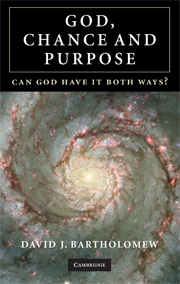Book contents
- Frontmatter
- Contents
- List of figures
- Preface
- 1 What is the problem?
- 2 What is chance?
- 3 Order out of chaos
- 4 Chaos out of order
- 5 What is probability?
- 6 What can very small probabilities tell us?
- 7 Can Intelligent Design be established scientifically?
- 8 Statistical laws
- 9 God's action in the quantum world
- 10 The human use of chance
- 11 God's chance
- 12 The challenge to chance
- 13 Choice and chance
- 14 God and risk
- References
- Further reading
- Index
6 - What can very small probabilities tell us?
Published online by Cambridge University Press: 05 June 2012
- Frontmatter
- Contents
- List of figures
- Preface
- 1 What is the problem?
- 2 What is chance?
- 3 Order out of chaos
- 4 Chaos out of order
- 5 What is probability?
- 6 What can very small probabilities tell us?
- 7 Can Intelligent Design be established scientifically?
- 8 Statistical laws
- 9 God's action in the quantum world
- 10 The human use of chance
- 11 God's chance
- 12 The challenge to chance
- 13 Choice and chance
- 14 God and risk
- References
- Further reading
- Index
Summary
It is often claimed that such things as the origin of life on earth and the coincidental values of cosmic constants are so improbable on the ‘chance hypothesis’ that they must point to divine action. The correctness of this conclusion depends on both correct calculation and valid forms of inference. Most examples fail on both counts. Two common mistakes in making probability calculations were identified in chapter five. In this chapter I explain and illustrate the three main approaches to inference: significance testing, likelihood inference and Bayesian inference.
WHAT IS THE ARGUMENT ABOUT?
It is tempting to argue that if something has a very small probability we can behave as if it were impossible. When we say ‘small’ here we are usually thinking of something that is extremely small, like one in several millions. We run our lives on this principle. Every day we are subject to a multitude of tiny risks that we habitually ignore. We might be struck by a meteorite, contract the ebola virus, find a two-headed coin or forget our name. Life would come to a halt if we paused to enumerate, much less prepare, for such possibilities. Even the most determined hypochondriac would be hard put to identify all the risks we run in matters of health. Surely, then, we can safely reject the possibility of anything happening if the probability is extremely small? Actually the position is more subtle and we must be a little more careful about what we are saying.
- Type
- Chapter
- Information
- God, Chance and PurposeCan God Have It Both Ways?, pp. 77 - 96Publisher: Cambridge University PressPrint publication year: 2008



